2006全国英语卷1(附答案)
2006全国英语卷1(附答案)

2006年普通高等学校招生全国统一考试(全国I)第Ⅰ卷(共115分)第一部分听力(共两节, 满分30分)第一节(共5小题;每小题1. 5分, 满分7. 5分)听下面5段对话。
每段对话后有一个小题, 从题中所给的A、B、C三个选项中选出最佳选项, 并标在试卷的相应位置。
听完每段对话后, 你都有10秒的时间来回答有关小题和阅读下一小题。
每段对话仅读一遍。
1. How much will the man pay for the tickets?A. £7.5.B. £15.C. £50.2. Which is the right gate for the man’s flight?A. Gate 16.B. Gate 22.C. Gate 25.3. How does the man feel about going to school by bike?A. Happy.B. Tired.C. Worried.4. When can the woman get the computers?A. On Tuesday.B. On Wednesday.C. On Thursday.5. What does the woman think of the shirt for the party?A. The size is not large enough.B. The material is not good.C. The color is not suitable.第二节听下面5段对话。
每段对话后有几个小题,从题中所给的A、B、C三个选项中选出最佳选项,并标在试卷的相应位置。
听每段对话前,你将有时间阅读各个小题,每小题5秒钟;听完后,各小题将给出5秒钟的作答时间。
每段对话读两遍。
听6段材料,回答6、7题。
6. What can we learn about Mr. Brown?A. He is in his office.B. He is at a meeting.C. He is out for a meal.7. What will the man probably do next?A. Call back.B. Come again.C. Leave a message.听第7段材料,回答第8、9题。
2006年高考英语听力(全国卷Ⅰ)原文-答案

2006高考英语听力全国1 原文听力原文(Text 1)M: How much are the tickets?W: There are 15 pounds each, but student tickets are half price.M: Could I have two students’ tickets please?(Text 2)M: Excuse me. I just want to check the boarding gate for BA16 to London, isn’t it 22?W: Oh it just changed, be 25, down that way on the right. Thanks.(Text 3)W: Do you live very far from your school?M: About 8 kilometers, but it doesn’t seem very far, there is much traffic along this road. It’s great to go by bike.(Text 4)W: Now, can we get the computers before Wednesday?M: Well, it depends, if it is less than 10 kilometers, we can deliv¬er them on Tuesday, but it is further away, it will be on Thursday. Where is your office?W: Just around the corner.(Text 5)W: You can’t wear that, John. It’s black.M: What’s wrong with a black shirt, everybody has a black shirt.W: It doesn’t look like going to a party.(Text 6)M: Hello, may I speak to Mr. Brown?W: I am sorry, he is out for lunch. Would you like to leave a message?M: Err, what time do you expect him back?W: Say, in half an hour.M: Thank you, I’ll try back later.(Text 7)W: Welcome to Youth Hotel, can I help you?M: I’d like a room for a night.W: Would you like a single room, a double room or a room for three?M: Oh, a single room please. Can I pay by check?W: Sure, fill in this form please.M: Need my student card number?W: No, just your address and telephone number.M: OK, here is the form.W: Very well. Here is your key to room 212.M: Thank you!W: Have a good stay!(Text 8)M: Hi, you must be that new secretary, welcome! I’m Tom Robison from public relations.W: Hi, Mr. Robison, Thank s. My name’s Lisa Jones, working in sales now.M: Please call me Tom, Lisa.W: OK, Tom. Have you worked here long?M: Yes, over 20 years.W: Wow that is a long time. Do you enjoy working here?M: Well, yes. I suppose I took the job because err well th e money is good, and it’s good place to work in, but to be honest, what I re¬ally enjoy is the chance to go abroad, just visiting othercoun¬tries. That’s the best thing.W: That’s nice, for me the best thing about working here is that I live close to the office, I can go home for lunch, and I don’t have to worry about the traffic.(Text 9)M: Now Cathy, do you know when the visitors from India are coming?W: We offer them three choices: the end of March, the middle of April and the beginning of May, and choose the earliest one which is good actually with exams coming up in May.M: Right. And how many are coming? Did you say about 12?W: Yes, they said 12 at first, but changed to 10 this morning.M: Good, we have 8 weeks to prepare, here are my suggestions. On the first day, a welcome party, then they can visit the schools in the district on the second and third days.W: We’ve got to remember this group w ants to look at how computers are being used in the classroom.M: Exactly, so I want to ask Mr. Goodman to give them a talk on this onthe afternoon of the third day.W: That will fit in very nicely.M: And on the last day, they would do some sightseeing, we could take them on the tour of London but many of them may have been there already, and Scotland will be too far away.W: Why not take them for a walk along the coast, it should be interesting.M: Good idea! Cathy I’m sure they’ll like it.(Text 10)W: There are many interesting stories about how a baby learns to say its first word. Now Mike, would you like to share your story with us?M: OK, here’s my story, I was about 18 months old I think and I had just started to say my first word. Every time a truck went by, I would shout a word that sounded like a track, but to everyone else, it sounded nothing like it. My parents tried to correct me, but failed. Then, about three months later, we traveled to New York, as we were waiting for our plane at the air¬port. I looked out of a huge window, at that very moment I saw the largest truck in the world, I had to tell someone about this. I turned to my father who was standing next to about a thousand people waiting for the very flight and screamed “Track! Track!” My father tried hard to shut me up, but I was so excited, I kept screaming my special word. My poor mother decided she didn’t know this baby and then ran into the ladies-room where she hid until I finally stopped. Well, I learned how to say truck1-5 B C A A C 6-10 C A A C A 11-15 B B A B B 16-20 C A B B C。
2006年高考全国卷1英语(含答案)
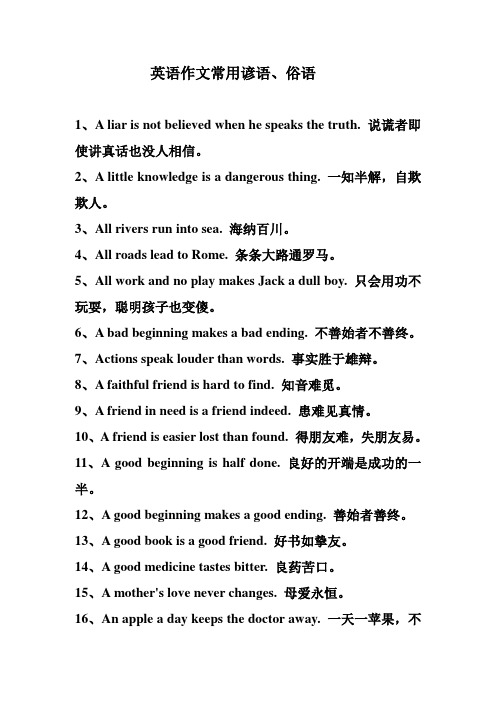
英语作文常用谚语、俗语1、A liar is not believed when he speaks the truth. 说谎者即使讲真话也没人相信。
2、A little knowledge is a dangerous thing. 一知半解,自欺欺人。
3、All rivers run into sea. 海纳百川。
4、All roads lead to Rome. 条条大路通罗马。
5、All work and no play makes Jack a dull boy. 只会用功不玩耍,聪明孩子也变傻。
6、A bad beginning makes a bad ending. 不善始者不善终。
7、Actions speak louder than words. 事实胜于雄辩。
8、A faithful friend is hard to find. 知音难觅。
9、A friend in need is a friend indeed. 患难见真情。
10、A friend is easier lost than found. 得朋友难,失朋友易。
11、A good beginning is half done. 良好的开端是成功的一半。
12、A good beginning makes a good ending. 善始者善终。
13、A good book is a good friend. 好书如挚友。
14、A good medicine tastes bitter. 良药苦口。
15、A mother's love never changes. 母爱永恒。
16、An apple a day keeps the doctor away. 一天一苹果,不用请医生。
17、A single flower does not make a spring. 一花独放不是春,百花齐放春满园。
18、A year's plan starts with spring. 一年之计在于春。
2006年高考英语真题(全国卷1)范文
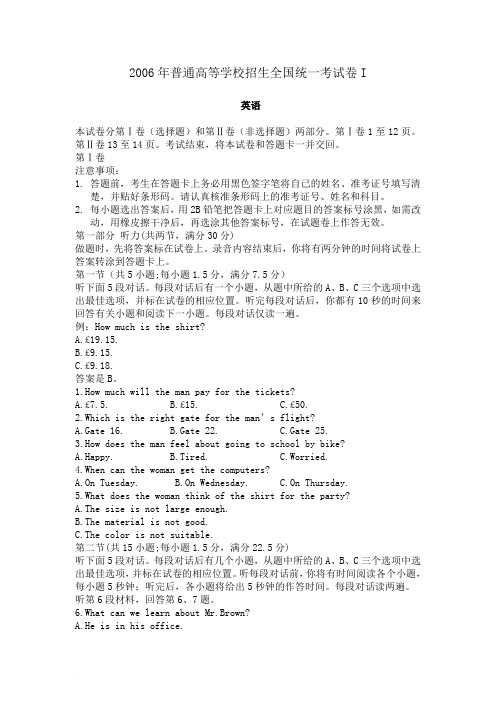
2006年普通高等学校招生全国统一考试卷I英语本试卷分第Ⅰ卷(选择题)和第Ⅱ卷(非选择题)两部分。
第Ⅰ卷1至12页。
第Ⅱ卷13至14页。
考试结束,将本试卷和答题卡一并交回。
第Ⅰ卷注意事项:1.答题前,考生在答题卡上务必用黑色签字笔将自己的姓名、准考证号填写清楚,并贴好条形码。
请认真核准条形码上的准考证号、姓名和科目。
2.每小题选出答案后,用2B铅笔把答题卡上对应题目的答案标号涂黑,如需改动,用橡皮擦干净后,再选涂其他答案标号,在试题卷上作答无效。
第一部分听力(共两节,满分30分)做题时,先将答案标在试卷上。
录音内容结束后,你将有两分钟的时间将试卷上答案转涂到答题卡上。
第一节(共5小题;每小题1.5分,满分7.5分)听下面5段对话。
每段对话后有一个小题,从题中所给的A、B、C三个选项中选出最佳选项,并标在试卷的相应位置。
听完每段对话后,你都有10秒的时间来回答有关小题和阅读下一小题。
每段对话仅读一遍。
例:How much is the shirt?A.£19.15.B.£9.15.C.£9.18.答案是B。
1.How much will the man pay for the tickets?A.£7.5.B.£15.C.£50.2.Which is the right gate for the man’s flight?A.Gate 16.B.Gate 22.C.Gate 25.3.How does the man feel about going to school by bike?A.Happy.B.Tired.C.Worried.4.When can the woman get the computers?A.On Tuesday.B.On Wednesday.C.On Thursday.5.What does the woman think of the shirt for the party?A.The size is not large enough.B.The material is not good.C.The color is not suitable.第二节(共15小题;每小题1.5分,满分22.5分)听下面5段对话。
2006年高考英语试题及答案(全国卷I)
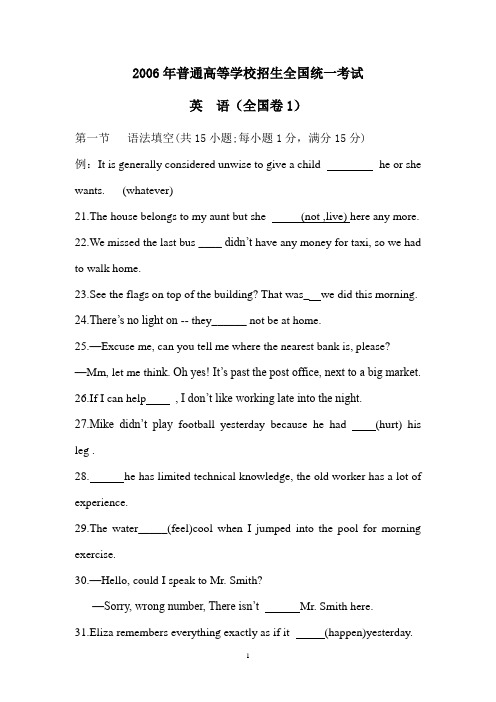
2006年普通高等学校招生全国统一考试英语(全国卷1)第一节语法填空(共15小题;每小题1分,满分15分)例:It is generally considered unwise to give a child he or she wants. (whatever)21.The house belongs to my aunt but she (not ,live) here any more.22.We missed the last bus ____ didn’t have any money for taxi, so we had to walk home.23.See the flags on top of the building? That was_ we did this morning.24.There’s no light on -- they______ not be at home.25.—Excuse me, can you tell me where the nearest bank is, please? —Mm, let me thi nk. Oh yes! It’s past the post office, next to a big market.26.If I can help , I don’t like working late into the night.27.Mike didn’t play football yesterday because he had (hurt) his leg .28. he has limited technical knowledge, the old worker has a lot of experience.29.The water_____(feel)cool when I jumped into the pool for morning exercise.30.—Hello, could I speak to Mr. Smith?—Sorry, wrong number, There isn’t Mr. Smith here.31.Eliza remembers everything exactly as if it (happen)yesterday.32. (surprise) and happy, Tony stood up and accepted the prize.33.Please remind me he said he was going. I may be in time to see him off.34.—I wonder______ I could possibly use your car for tonight?—Sure, go ahead. I’m not u sing it anyhow.35.Mary, (come) here---everybody else, stay where you are.第二节完形填空(共20小题;每小题1.5分,满分30分)阅读下面短文,从短文后所给各题的四个选项(A、B、C和D)中,选出可以填入空白处的最佳选项,并在答题卡上将该项涂黑。
2006全国高考英语I真题(附答案)
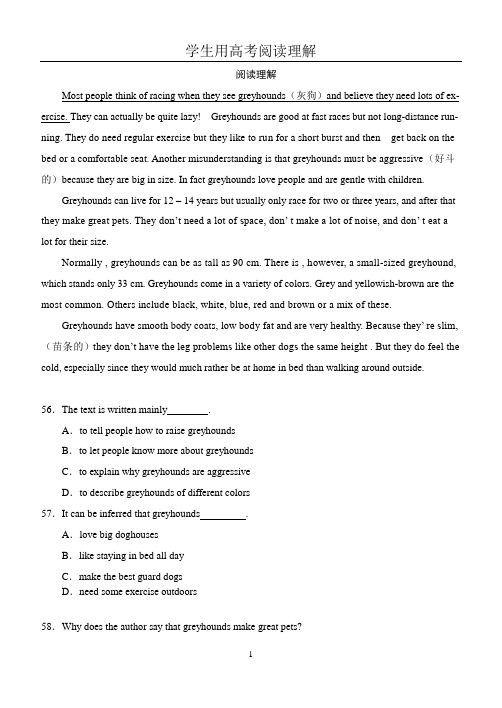
阅读理解Most people think of racing when they see greyhounds(灰狗)and believe they need lots of ex- ercise. They can actually be quite lazy! Greyhounds are good at fast races but not long-distance run- ning. They do need regular exercise but they like to run for a short burst and then get back on the bed or a comfortable seat. Another misunderstanding is that greyhounds must be aggressive(好斗的)because they are big in size. In fact greyhounds love people and are gentle with children.Greyhounds can live for 12 – 14 years but usually only race for two or three years, and after that they make great pets. They don’t need a lot of space, don’ t make a lot of noise, and don’ t eat a lot for their size.Normally , greyhounds can be as tall as 90 cm. There is , however, a small-sized greyhound, which stands only 33 cm. Greyhounds come in a variety of colors. Grey and yellowish-brown are the most common. Others include black, white, blue, red and brown or a mix of these.Greyhounds have smooth body coats, low bod y fat and are very healthy. Because they’ re slim, (苗条的)they don’t have the leg problems like other dogs the same height . But they do feel the cold, especially since they would much rather be at home in bed than walking around outside.56.The text is written mainly .A.to tell people how to raise greyhoundsB.to let people know more about greyhoundsC.to explain why greyhounds are aggressiveD.to describe greyhounds of different colors57.It can be inferred that greyhounds .A.love big doghousesB.like staying in bed all dayC.make the best guard dogsD.need some exercise outdoors58.Why does the author say that greyhounds make great pets?A.They are big in size.B.They live a very long life.C.They can run races for some time.D.They are quiet and easy to look after.59.If you keep a pet greyhound, it is important _____________.A.to keep it slimB.to keep it warmC.to take special care of its legsD.to take it to animal doctors regularlyBMany years ago, when I was fresh out of school and working in Denver, I was driving to my parents’ home in Missouri for Christmas.I stopped at a gas station(加油站) about 50 miles from Oklahoma City, where I was planning to stop and visit a friend. While I was standing in line at the cash register(收款台), I said hello to an older couple who were also paying for gas.I took off, but had gone only a few miles when black smoke poured from the back of my car. I stopped and wondered what I should do. A car pulled up behind me. It was the couple I had spoken to at the gas station. They said they would take me to my friend’s. We chatted on the way into the city, and when I got out of the car, the husband gave me his business card.I wrote him and his wife a thank-you note for helping me. Soon afterward, I received a Christ-mas present from them. Their note that came with it said that helping me had made their holidays meaningful.Years later, I drove to a meeting in a nearby town in the morning. In late afternoon I returned to my car and found that I’d left the lights on all day, and the battery(电池) was dead. Then I noticed that the Friendly Ford dealership-a shop selling cars-was right next door. I walked over and found two salesmen in the showroom.“Just how friendly is Friendly Ford?” I asked and exp lained my trouble. They quickly drove a pickup truck to my car and started it. They would accept no payment, so when I got home, I wrote them a note to say thanks. I received a letter back from one of the salesmen. No one had ever taken the time to write him and say thank you, and it meant a lot, he said.“Thank you”-two powerful words. They’re easy to say and mean so much.60.The author planned to stop at Oklahoma City _______.A.to visit a friendB.to see his parentsC.to pay or the cash registerD.to have more gas for his car61.The words “took off ” underlined in Paragraph 2 mean “________”.A.turned offB.moved offC.put upD.set up62.What happened when the author found smoke coming out of his car?A.He had it pulled back to the gas station.B.The couple sent him a business card.C.The couple offered to help him.D.He called his friend for help.63.The battery of the author’s car was dead because _______.A.something went wrong with the lightsB.the meeting lasted a whole dayC.he forgot to turn off the lightsD.he drove too long a distance64.By telling his own experiences, the author tries to show _______.A.how to write a thank-you letterB.how to deal with car problemsC.the kind-heartedness of older peopleD.the importance of expressing thanksCA study of English learning problems was carried out among a total of 106 foreign students. It shows that most students considered understanding spoken English to be their biggest problem on ar-rival. This was followed by speaking. Writing increased as a problem as students discovered difficult- ties in writing papers that they were now expected to hand in. Reading remained as a significant(显著的)problem.The information gained helped us in determining where special attention should be paid in our course. Although many students have chosen to join the course with a reasonable motivation(动机), we considered it important to note what seemed to encourage interest. Nearly all the students have experienced some kind of grammar-based English teaching in their own country. To use the same method would be self-defeating because it might reduce motivation, especially if it has failed in the past. Therefore a different method may help because it is different.Variety of activity was also seen as a way of maintaining(保持)or increasing motivation. Sev- eral years ago we had one timetable that operated throughout, but we soon found that both the students and the teachers lost interest by about halfway through the ten weeks. This led us to a major re-think, so finally we brought it into line with the expressed language needs of the students.65.What is the text mainly about?A.Foreign students have more problems.B.There are many ways to improve English.C.Teaching should meet students’ needs.D.English learning problems should be studied again.66.Writing became a bigger problem when foreign students ___________.A.had to write their papersB.became better at speakingC.became less interested in readingD.had fewer problems with listening67.We may infer from the last two paragraphs that ___________.A.different teaching methods should be usedB.grammar-based teaching seems to be encouragingC.English courses are necessary for foreign studentsD.teaching content should be changed halfway68.The word “it” underlined in the last paragraph refers to “___________”.A.re-thinkB.activityC.motivationD.timetableDSince my retirement(退休) from teaching music in 2001, I have spent a good deal of time painting as an artist. I actually began drawing again in the summer of 1995 when my father died, so perhaps I was trying to recover from the loss of my father, or maybe it was just that it brought back memories of him. In any case, I drew animals and landscapes(风景画) much influ-enced(影响) by Krenkel and St. John for five years.For some strange reason, I had been waiting until my retirement to start doing watercolors again, but as soon as I walked out of the school door for the last time I picked up my brushes and rediscovered Andrew Wyeth, who quickly became my favorite artist. I had looked through all the art books I had on my shelves and found his watercolors to be the closest to how I thought good watercol-ors should look. So I painted landscapes around Minnesota for three years and tried out many other types of painting. However, watercolors remained my first choice, and I think I did my best work there, showing my painting at a number of art exhibitions.Art is now together with my piano playing and reading. There is a time for everything in my world, and it is wonderful to have some time doing what I want to do. As Confucius once said, “At seventy I can follow my heart’s desire.”69.What is the text mainly about?A.Learning to paint in later life. B.How to paint watercolors.C.An artist-turned teacher. D.Life after retirement70.The author started drawing again in 1995 because ___________.A.he hoped to draw a picture of his fatherB.he couldn’t stop missing his fatherC.he had more time after retirementD.he liked animals and landscapes71.We can infer from the text that the author ____________.A.had been taught by Krenkel and St. JohnB.painted landscapes in Minnesota for 5 yearsC.believed Wyeth to be the best in watercolorsD.started his retirement life at the age of seventy72.How does the author probably feel about his life as an artist?A.Very enjoyable. B.A bit regretful.C.Rather busy. D.Fairly dull.。
2006年高考英语试题及答案
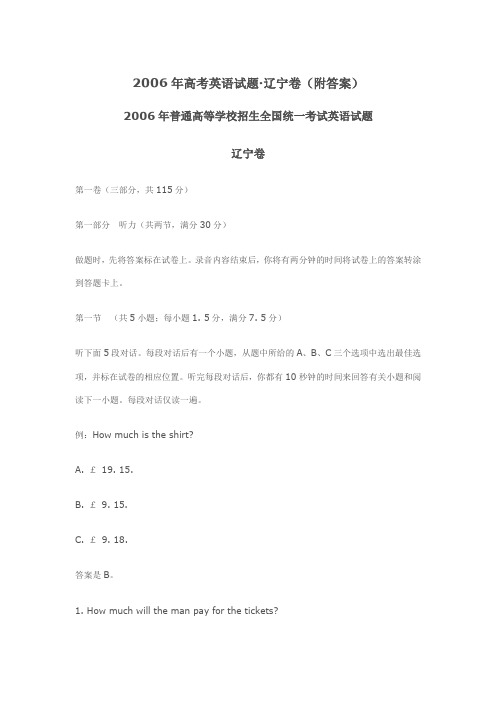
2006年高考英语试题·辽宁卷(附答案)2006年普通高等学校招生全国统一考试英语试题辽宁卷第一卷(三部分,共115分)第一部分听力(共两节,满分30分)做题时,先将答案标在试卷上。
录音内容结束后,你将有两分钟的时间将试卷上的答案转涂到答题卡上。
第一节(共5小题;每小题1. 5分,满分7. 5分)听下面5段对话。
每段对话后有一个小题,从题中所给的A、B、C三个选项中选出最佳选项,并标在试卷的相应位置。
听完每段对话后,你都有10秒钟的时间来回答有关小题和阅读下一小题。
每段对话仅读一遍。
例:How much is the shirt?A. £19. 15.B. £9. 15.C. £9. 18.答案是B。
1. How much will the man pay for the tickets?A. £7. 5B. £15C. £50.2. Which is the right gate for the man's flight?A. Gate 16.B. Gate 22.C. Gate 25.3. How does the man feel about going to school by bike?A. Happy.B. Tired.C. Worried.4. When can the woman get the computers?A. On Tuesday.B. On Wednesday.C. On Thursday.5. What does the woman think of the shirt for the party?A. The size in not large enough.B.The material is not good.C.The color is not suitable.第二节(共15小题;每小题1. 5分,满分22. 5分)听下面5段对话。
每段对话后有几个小题,从题中所给的A、B、C三个选项中选出最佳选项,并标在试卷的相应位置。
2006年考研英语一真题答案(含解析)

2006 年全国硕士研究生入学考试英语试题Directions: Read the following text. Choose the best word(s)for each numbered blank and mark A,B,C or D on ANSWER SHEET 1(10 points)The homeless make up a growing percentage of America’s population. 1 , homelessness has reached such proportions that local government can’t possibly 2 . To help homeless people 3 independence, the federal government must support job training programs, 4 the minimum wage, and fund more low-cost housing.5 everyone agrees on the numbers of Americans who are homeless. Estimates6 anywhere from 600,000 to 3 million.7 the figure may vary, analysts do agree on another matter: that the number of the homeless is8 . One of the federal government’s s tudies9 that the number of the homeless will reach nearly 19 million by the end of this decade.Finding ways to 10 this growing homeless population has become increasingly difficult. 11 when homeless individuals manage to find a 12 that will give them three meals a day and a place to sleep at night, a good number still spend the bulk of each day 13 the street. Part of the problem is that many homeless adults are addicted to alcohol or drugs. And a significant number of the homeless have serious mental disorders. Many others, 14 not addicted or mentally ill, simply lack the everyday 15 skills needed to turn their lives 16 . Boston Globe reporter Chris Reidy notes that the situation will improve only when there are _17 programs that address the many needs of the homeless. 18 Edward Zlotkowski, director of community service at Bentley College in Massachusetts, _19 it, “There has to be _20 _of programs. What we need is a package deal.”1.[A]Indeed [B]Likewise [C]Therefore [D]Furthermore 2.[A]stand [B]cope [C]approve [D]retain3.[A]in [B]for [C]with [D]toward4.[A]raise [B]add [C]take [D]keep5.[A]generally [B]almost [C]hardly [D]not6.[A]cover [B]change [C]range [D]differ7.[A]Now that [B]Although [C]Provided [D]Except that8.[A]inflating [B]expanding [C]increasing [D]extending9.[A]predicts [B]displays [C]proves [D]discovers10.[A]assist [B]track [C]sustain [D]dismiss11.[A]Hence [B]But [C]Even [D]Only12.[A]lodging [B]shelter [C]dwelling [D]house13.[A]searching [B]strolling [C]crowding [D]wandering14.[A]when [B]once [C]while [D]whereas15.[A]life [B]existence [C]survival [D]maintenance16.[A]around [B]over [C]on [D]up17.[A]complex [B]comprehensive [C]complementary [D]compensating18.[A]So [B]Since [C]As [D]Thus19.[A]puts [B]interprets [C]assumes [D]makes20.[A]supervision [B]manipulation [C]regulation [D]coordination文章中心:完型填空的命题理论规定,文章的中心思想一般体现在文章首段的首句;有时首段首句其他段落的首句共同表达文章中心思想。
2006年英语一真题(附答案)

elegant atmosphere. Instead of intimate shops catering to a knowledgeable elite ” these were stores “ anyone could enter , regardless of class or background. hus
B. interprets
C. assumes
D. makes
B. manipulation C. regulation
D. coordination
Section n Reading Comprehension
Part A Directions:
Read the following four texts. Answer the questions below each text by choosing A , B , C , or D. Mark your answers on ANSWER SHEET 1. ( 40 points )
B. strolling
C. dwelling C. crowding
D. house D. wandering
B . once
C. while
D. whereas
B . existence
C. survival
D. maintenance
B . over
C. on
D. up
B. comprehensive C. complementary D. compensating
2006年高考英语全国卷I试题及答案 (3)
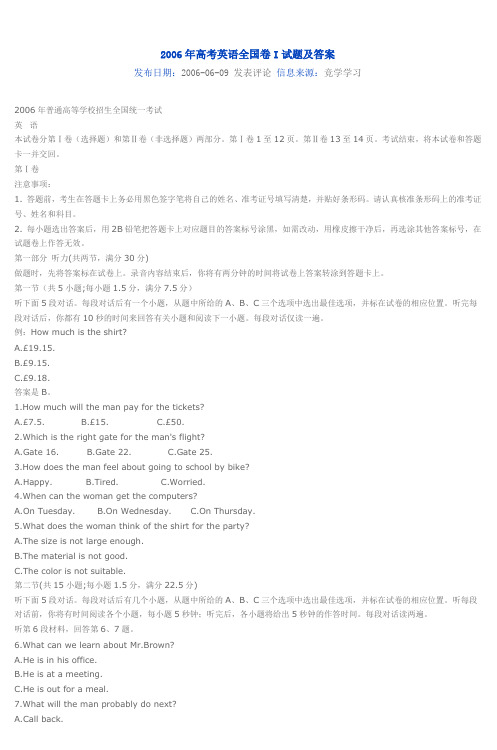
2006年高考英语全国卷I试题及答案发布日期:2006-06-09 发表评论信息来源:竞学学习2006年普通高等学校招生全国统一考试英语本试卷分第Ⅰ卷(选择题)和第Ⅱ卷(非选择题)两部分。
第Ⅰ卷1至12页。
第Ⅱ卷13至14页。
考试结束,将本试卷和答题卡一并交回。
第Ⅰ卷注意事项:1. 答题前,考生在答题卡上务必用黑色签字笔将自己的姓名、准考证号填写清楚,并贴好条形码。
请认真核准条形码上的准考证号、姓名和科目。
2. 每小题选出答案后,用2B铅笔把答题卡上对应题目的答案标号涂黑,如需改动,用橡皮擦干净后,再选涂其他答案标号,在试题卷上作答无效。
第一部分听力(共两节,满分30分)做题时,先将答案标在试卷上。
录音内容结束后,你将有两分钟的时间将试卷上答案转涂到答题卡上。
第一节(共5小题;每小题1.5分,满分7.5分)听下面5段对话。
每段对话后有一个小题,从题中所给的A、B、C三个选项中选出最佳选项,并标在试卷的相应位置。
听完每段对话后,你都有10秒的时间来回答有关小题和阅读下一小题。
每段对话仅读一遍。
例:How much is the shirt?A.£19.15.B.£9.15.C.£9.18.答案是B。
1.How much will the man pay for the tickets?A.£7.5.B.£15.C.£50.2.Which is the right gate for the man's flight?A.Gate 16.B.Gate 22.C.Gate 25.3.How does the man feel about going to school by bike?A.Happy.B.Tired.C.Worried.4.When can the woman get the computers?A.On Tuesday.B.On Wednesday.C.On Thursday.5.What does the woman think of the shirt for the party?A.The size is not large enough.B.The material is not good.C.The color is not suitable.第二节(共15小题;每小题1.5分,满分22.5分)听下面5段对话。
2006年高考英语试题与参考答案

2006年高考英语试题与参考答案(全国卷Ⅱ)本试卷分第一卷(选择题)和第二卷(非选择题)两部分。
第一卷1至10页。
第二卷11至14页。
考试结束,将本试卷和答题卡一并交回。
第一卷注意事项:1、答第一卷前,考生务必将自己的姓名、准考证号、考试科目涂写在答题卡上。
2、每小题选出答案后,用铅笔把答题卡上对应题目的答案标号涂黑。
如需改动,用橡皮擦干净后,再选涂其他答案标号。
不能答在试卷上。
第一部分英语知识运用(共三节,满分50分)第一节语音知识(共5小题;每小题1分,满分5分)从A、B、C、D四个选项中,找出其划线部分与所给单词的划线部分读音的选项,并在答题卡上将该项涂黑。
例:haveA. gaveB. saveC. hatD. made答案是C。
1.hearA. nearlyB. searchC. bearD. heart2.changeA. machineB. headacheC. techniqueD. research3.surpriseA. policeB. apologizeC. bridgeD. children4.safelyA. baseB. seasonC. AsiaD. usual5.museumA. subjectB. trueC. bulgeD. busy第二节语法和词汇知识(共15小题;每小题1分,满分15分)从A、B、C、D四个选项中,选出可以填入空白处的最佳选项,并在答题卡上将该项涂黑。
例:We _________last night , but we went to the concert instead.A. must have studiedB. might studyC. should have studiedD. would study 答案是C。
6.—Will you be able to finish your report today?—________.A. I like itB.I hope soC. I’ll do soD. I’d love it 7.We forgot to bring our tickets, but please let us enter,________.A. do youB. can weC. will youD. shall we8. Your story is perfect; I’ve never heard _________ before.A. the better oneB. the best oneC. a better oneD. a good one9. It was not until she got home ________ Jennifer realized she had lost her keys.A. whenB. thatC. whereD. before10. We hope that as many people as-possible ________join us for the picnic tomorrow.A. needB. mustC. shouldD. can11. It is no ________arguing with Bill because he will never change his mind.A. useB. helpC. timeD. way12. John, a friend of mine , who got married only last week , spent $3,000 more than he ________ for the wedding.A. will planB. has plannedC. would planD. had planned13. We thought there were 35 students in the dining hall , ________, in fact, there were 40.A. whileB. whetherC. whatD. which14. -Did you take enough money with you?-No, I needed ______ I thought I would.A. not so much asB. as much asC. much more thanD. much less than15. Mary wanted to travel around the world all by herself, but her parents did not _______ her to do so.A. forbidB. allowC. followD. ask16. -What did your parents think about your decision?-They always let me do _____ I think I should.A. whenB. thatC. howD. what17. We often provide our children with toys, footballs or basketballs, _____ that all children like these things.A. thinkingB. thinkC. to thinkD. thought18. There were a lot of people standing at the door and the small girl couldn’t get _______ .A. betweenB. throughC. acrossD. beyond19. I know you don’t like ______ musi c very much. But what do you think of _____ music in the film we saw yesterday?A. 不填;不填B. the;theC. the;不填D. 不填;the20. As you can see, the number of cars on roads ______ rising these days.A. was keepingB. keepC. keepsD. were keeping第三节完型填空(共20小题;每小题1.5分,满分30分)阅读下面短文,从短文后所给各题的四个选项(A、B、C和D)中,选出可以填入空白处的最佳选项,并在答题卡上将该项涂黑。
2006年普通高等学校招生全国统一考试 英语试题(一)
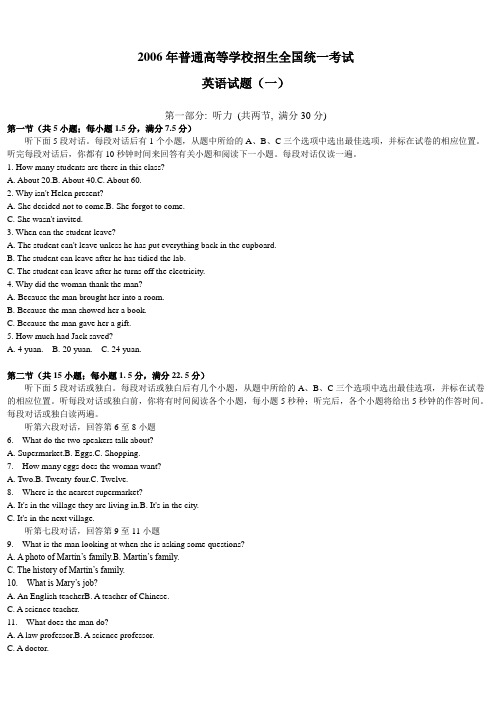
2006年普通高等学校招生全国统一考试英语试题(一)第一部分: 听力(共两节, 满分30分)第一节(共5小题;每小题1.5分,满分7.5分)听下面5段对话。
每段对话后有1个小题,从题中所给的A、B、C三个选项中选出最佳选项,并标在试卷的相应位置。
听完每段对话后,你都有10秒钟时间来回答有关小题和阅读下一小题。
每段对话仅读一遍。
1. How many students are there in this class?A. About 20.B. About 40.C. About 60.2. Why isn't Helen present?A. She decided not to come.B. She forgot to come.C. She wasn't invited.3. When can the student leave?A. The student can't leave unless he has put everything back in the cupboard.B. The student can leave after he has tidied the lab.C. The student can leave after he turns off the electricity.4. Why did the woman thank the man?A. Because the man brought her into a room.B. Because the man showed her a book.C. Because the man gave her a gift.5. How much had Jack saved?A. 4 yuan.B. 20 yuan.C. 24 yuan.第二节(共15小题;每小题1. 5分,满分22. 5分)听下面5段对话或独白。
2006年全国高考听力及原文(全国卷1卷)
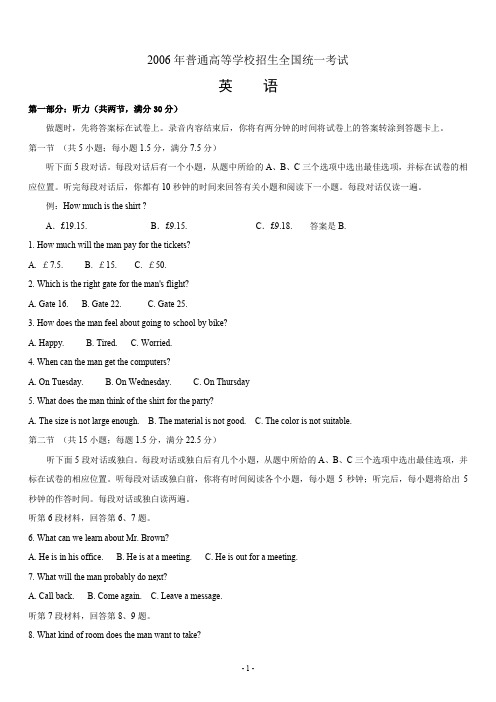
2006年普通高等学校招生全国统一考试英语第一部分:听力(共两节,满分30分)做题时,先将答案标在试卷上。
录音内容结束后,你将有两分钟的时间将试卷上的答案转涂到答题卡上。
第一节(共5小题;每小题1.5分,满分7.5分)听下面5段对话。
每段对话后有一个小题,从题中所给的A、B、C三个选项中选出最佳选项,并标在试卷的相应位置。
听完每段对话后,你都有10秒钟的时间来回答有关小题和阅读下一小题。
每段对话仅读一遍。
例:How much is the shirt ?A.£19.15. B.£9.15. C.£9.18. 答案是B.1. How much will the man pay for the tickets?A. £7.5.B. £15.C. £50.2. Which is the right gate for the man's flight?A. Gate 16.B. Gate 22.C. Gate 25.3. How does the man feel about going to school by bike?A. Happy.B. Tired.C. Worried.4. When can the man get the computers?A. On Tuesday.B. On Wednesday.C. On Thursday5. What does the man think of the shirt for the party?A. The size is not large enough.B. The material is not good.C. The color is not suitable.第二节(共15小题;每题1.5分,满分22.5分)听下面5段对话或独白。
每段对话或独白后有几个小题,从题中所给的A、B、C三个选项中选出最佳选项,并标在试卷的相应位置。
- 1、下载文档前请自行甄别文档内容的完整性,平台不提供额外的编辑、内容补充、找答案等附加服务。
- 2、"仅部分预览"的文档,不可在线预览部分如存在完整性等问题,可反馈申请退款(可完整预览的文档不适用该条件!)。
- 3、如文档侵犯您的权益,请联系客服反馈,我们会尽快为您处理(人工客服工作时间:9:00-18:30)。
2006年普通高等学校招生全国统一考试(全国I)第Ⅰ卷(共115分)第一部分听力(共两节, 满分30分)第一节(共5小题;每小题1. 5分, 满分7. 5分)听下面5段对话。
每段对话后有一个小题, 从题中所给的A、B、C三个选项中选出最佳选项, 并标在试卷的相应位置。
听完每段对话后, 你都有10秒的时间来回答有关小题和阅读下一小题。
每段对话仅读一遍。
1. How much will the man pay for the tickets?A. £7.5.B. £15.C. £50.2. Which is the right gate for the man’s flight?A. Gate 16.B. Gate 22.C. Gate 25.3. How does the man feel about going to school by bike?A. Happy.B. Tired.C. Worried.4. When can the woman get the computers?A. On Tuesday.B. On Wednesday.C. On Thursday.5. What does the woman think of the shirt for the party?A. The size is not large enough.B. The material is not good.C. The color is not suitable.第二节听下面5段对话。
每段对话后有几个小题,从题中所给的A、B、C三个选项中选出最佳选项,并标在试卷的相应位置。
听每段对话前,你将有时间阅读各个小题,每小题5秒钟;听完后,各小题将给出5秒钟的作答时间。
每段对话读两遍。
听6段材料,回答6、7题。
6. What can we learn about Mr. Brown?A. He is in his office.B. He is at a meeting.C. He is out for a meal.7. What will the man probably do next?A. Call back.B. Come again.C. Leave a message.听第7段材料,回答第8、9题。
8. What kind of room does the man want to take?A. A single room.B. A double room.C. A room for three.9. What does the man need to put in the form?A. Telephone and student card numbers.B. Student card number and address.C. Address and telephone number.听第8段材料,回答第10至12题。
10. What is the relationship between the speakers?A. Fellow clerks.B. Boss and secretary.C. Customer and salesperson.11. What does the man like about his job?A. Living close to the office.B. Chances to go abroad.C. Nice people to work with.12. What do we know about the woman?A. She likes traveling.B. She is new to the company.C. She works in public relations. 听第9段材料,回答第13至16题。
13. When will the visitors come?A. In March.B. In April.C. In May.14. How many visitors are coming?A. 8.B. 10.C. 12.15. What will the visitors do on the second day?A. Go to a party.B. Visit schools.C. Attend a lecture.16. Where will the visitors go on the final day?A. To London.B. To Scotland.C. To the coast.听第10段材料,回答第17至20题。
17. What is the first word the baby tried to say?A. Truck.B. OK.C. Duck.18. How old was the baby when he learned to say that word correctly?A. About 18 months.B. About 21 months.C. About 24 months.19. What did the father do when the baby screamed that word at the airport?A. He corrected the baby.B. He tried to stop the baby.C. He hid himself somewhere.20. Why did the mother pretend not to know the baby?A. She got angry with the father.B. She was frightened by the noise.C. She felt uneasy about the noisy baby.第一部分英语知识运用(共两节, 满分45分)第一节单项填空(共15小题;每小题1分, 满分15分)从A、B、C、D四个选项中, 选出可以填入空白处的最佳选项, 并在答题卡上将该项涂黑。
21. The house belongs to my aunt but she ____ here any more.A. hasn’t livedB. didn’t liveC. hadn’t livedD. doesn’t live22. We ____ the last bus and didn’t have any money for taxi, so we had to walk home.A. reachedB. lostC. missedD. caught23. See the flags on top of the building? That was ____ we did this morning.A. whenB. whichC. whereD. what24. There’s no light on — they ____ be at home.A. can’tB. mustn’tC. needn’tD. shouldn’t25. ---Excuse me, can you tell me where the nearest bank is, please?--- ____ Oh yes! It’s past the post office, next to a big market.A. Mm, let me think.B. Oh, I beg your pardon?C. You’re welcome.D. What do you mean?26. If I can help ____, I don’t like working late into the night.A. soB. thatC. itD. them27. Mike didn’t play football yesterday because he had ____ his leg.A. damagedB. hurtC. hitD. struck28. ____ he has limited technical knowledge, the old worker has a lot of experience.A. SinceB. UnlessC. AsD. Although29. The water ____ cool when I jumped into the pool for morning exercise.A. was feltB. is feltC. feltD. feels30. ---Hello, could I speak to Mr. Smith?---Sorry, wrong number. There isn’t ____ Mr. Smith here.A. 不填B. aC. theD. one31. Eliza remembers everything exactly as if it ____ yesterday.A. was happeningB. happensC. has happenedD. happened32. ____ and happy, Tony stood up and accepted the prize.A. SurprisingB. SurprisedC. Being surprisedD. To be surprising33. Please remind me ____ he said he was going. I may be in time to see him off.A. whereB. whenC. howD. what34. ---I wonder if I could possibly use your car for tonight?--- ____. I’m not using it anyhow.A. Sure, go aheadB. I don’t knowC. Yes, indeedD. I don’t care35. Mary, ____ here — everybody else, stay where you are.A. comeB. comesC. to comeD. coming第二节完形填空(共20小题;每小题1. 5分, 满分30分)阅读下面短文, 从短文后所给各题的四个选项(A、B、C和D)中, 选出可以填入空白处的最佳选项, 并在答题卡上将该项涂黑。
